Rosado Continues to Improve Engineering Camps, Grow the STEM Pipeline to Illinois
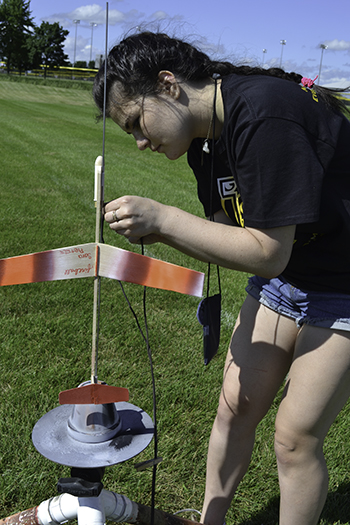
An Aerospace GAMES camper prepares the glider she designed and built for launch.
July 27, 2016
Sahid Rosado is a STEM outreach force to be reckoned with on the University of Illinois campus. After starting out as just an instructor for an Environmental Engineering G.A.M.E.S. camp session a few years ago, she is now the Outreach Coordinator for the College of Engineering and is in the process of not just improving but revolutionizing Illinois’ Engineering camps via the addition of middle school students as she seeks to grow the STEM pipeline to the University.
This summer, 342 students attended Engineering's 13 week-long camps: 8 G.A.M.E.S (Girl’s Adventures in Mathematics, Engineering, and Science) and 5 WYSE (Worldwide Youth in Science and Engineering) camps. Rosado was in charge of them all, which means she helped departments create fun and informative curriculum, made sure campers had suitable places in the dorms to live and to eat, arranged exciting evening activities, and ensured that students were exposed to the University of Illinois campus as a prospective college via a number of activities.
While the camps were already great and informative when she inherited them, Rosado is never content to rest on her laurels, but is always looking for ways to improve them. For example the G.A.M.E.S. Mechanical Engineering camp, G-BAM (Girls Building Awesome Machines) and the Material Science and Engineering camp, GLAM (Girls Learning About Materials), both revamped their curriculum for the 2016 summer. The G.A.M.E.S. computer science camp also experienced a change this summer. Rosado claims, “The computer science was different this year than it was last year because now we have them on a rotation, so last year was robotics, and this year it’s very general computer science track.” This change allowed the campers to spend more time coding and programming.
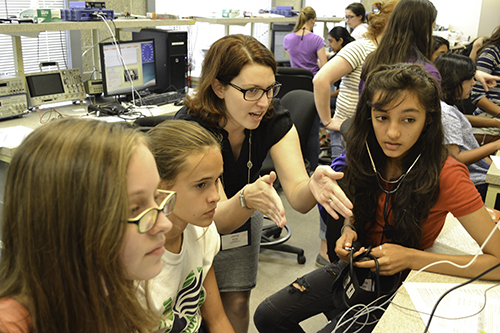
Bioengineering GAMES camp director Jenny Amos explains an activity to participants.
The G.A.M.E.S. camps weren’t the only ones to experience change. Similar to G-BAM GAMES camp, the Exploring Mechanical Engineering WYSE camp, also revamped its curriculum. Also, the WYSE Discover BioE camp had a change in the team running it, and a field trip to JUMP Simulation Education Center in Peoria was added, (as well as to their BIOE G.A.M.E.S. camp counterpart).
And in a huge push to get campers to consider Illinois as their future university, another big change occurred during camp this year: All the campers got to hear from a University of Illinois Admissions representative. Rosado exclaims that “This year we actually had a rep from admissions come every single week. Last year we weren’t able to make that happen, so this year admissions really worked with us.”
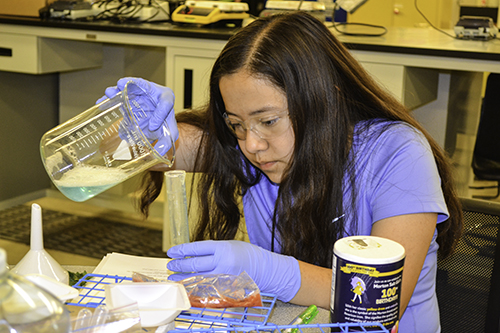
A Chemical Engineering GAMES camper extracts DNA from strawberries.
Curriculum wasn’t the only part of these camps to get an update; the evening activities all campers participate in were also improved. For GAMES campers, Rosado upped the number of MakerGirl sessions. She said “The campers loved MakerGirl based on the surveys they provided us last year…and they’re now doing two sessions instead of one just because we have so many girls.” Fridays were typically “relaxation day” for the campers, but “some of the counselors last year suggested that the girls wanted to go to Green Street and go shopping” Rosado explains, “so now we made that an activity. On Friday evening we give them the option of eating at Hendrick House or eating out on Green Street, to just kind of experience a campus type of thing. We call it Green Street Shopping Day.” Also, the usual kickball sporting event has been replaced with the option of yoga or Zumba, run by two enthusiastic counselors. Not everything was changed though; due to popular demand, the scavenger hunt and movie night were kept.
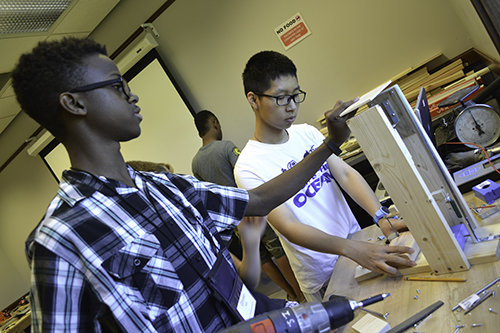
Two high school boys participating in Exploring Mechanical Engineering WYSE Camp work on building a 3D printer.
While the Engineering camps are doing extraordinarily well and the campers are having a blast, Rosado isn’t content to leave things as they are. She has some great plans for the future to make camps like these, and similar activities, available for more age ranges. So the next big hurdle for Rosado to conquer is the middle school age range.
“Middle school is a very crucial age, especially for girls,” she explains. “There is a lot of research and articles saying how important that age is. They show that girls, or in general students, they show very keen interest in STEM. When they track the students in high school, they’ve lost that interest. So there’s a lot of research that shows that middle school is such a crucial age for students because that’s when we can really grab their attention.”
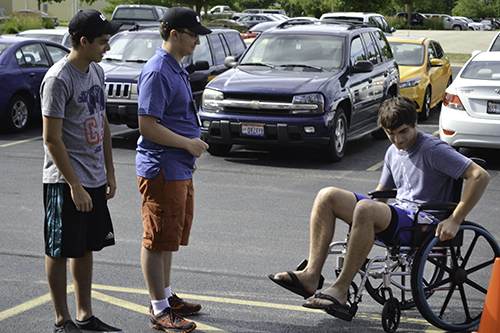
An Exploring Mechanical Engineering WYSE camper operates a wheelchair during a relay at the Intelliwheels startup company.
With support from this research, Rosado plans to add a middle school track to the G.A.M.E.S material science camp and call it Mid-GLAM. For the first year, it’s only going to be a day camp for local girls. However, depending on the success of and thoughts about the camp, it may be made into an overnight camp, which would make it more accessible for girls who aren’t local.
While Rosado acknowledges the importance of reaching out to middle school students, this doesn’t mean Rosado is over G.A.M.E.S. “I would love to keep our high school program G.A.M.E.S., though,” she acknowledges, “because I think it’s important. Even last year, among incoming seniors who attended G.A.M.E.S., 74% applied to Engineering at Illinois,” so Rosado and team are obviously doing something right.
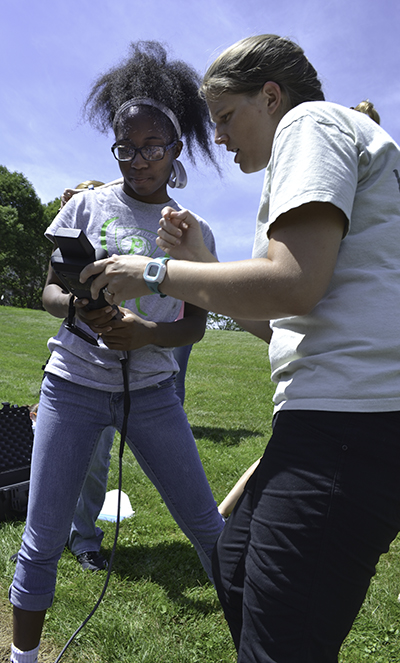
Environmental Engineering and Sustainability GAMES camper (left) uses an instrument to make a measurement during an activity at Boneyard Creek.
Adding the middle school track isn’t the only thing on Rosado’s list of goals. To further entrench the STEM pipeline to Illinois Engineering, she also wants to expand the ChiS&E (Chicago Pre-College Science and Engineering) program, which exposes Chicago Public Schools students to STEM and the University of Illinois, from just 6th and 7th graders to 6th, 7th, and 8th graders. In addition to this she’s launching a course through LinC (Learning in Community Program) to University of Illinois undergraduates in order to help raise undergrad’s social awareness and generate more undergrad volunteers to mentor the ChiS&E Program.
While all these goals and achievements would be satisfying and fulfilling to most people, Rosado has yet to quench her thirst for fulfillment. She actually believes she “will never feel fulfilled.” This is not necessarily a negative feeling though. When talking about her projects, Rosado states “I’m definitely moving towards the direction that I want to move in, but as I start thinking of things to do then I’m like ‘Oh, we can do this too’ so I feel like I will never be fulfilled, but it’s good. I’m happy with what we’re doing.” Rosado is much more into the journey and creation of STEM awareness and empowerment than the destination of it.
Story by Alexandra Anne Peltier, I-STEM undergraduate student. Photographs by Elizabeth Innes, Communications Specialist, I-STEM Education Initiative.
More: Faculty Feature, GAMES, Summer Camp, Women in STEM, WYSE, 2016
For additional I-STEM articles on 2016 engineering camps, please see:
- AERO G.A.M.E.S Campers Soar with New Aerospace Knowledge
- At G-BAM GAMES Camp Girls Learn They Can Make a Difference Via Engineering
- G.A.M.E.S. Campers Learn about Bioengineering While Breaking Down Stereotypes
- High School Girls Discover Chemical & Biomolecular Engineering at GAMES Camp
- Girls Experience Electrical Engineering First-Hand at the 2016 GLEE GAMES Camp
- MechSE's WYSE Camp Helps High School Students Explore Mechanical Engineering
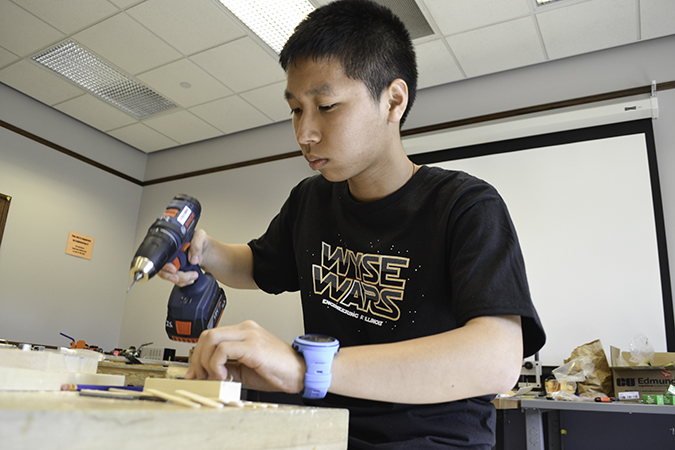
A camper at Exploring Mechanical Engineering WYSE camp uses tools in MEL to create a prosthetic device his team designed.













.jpg)
















